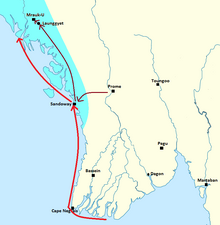Toungoo–Mrauk-U War (1545–47)
| Toungoo–Mrauk-U War (1545–1547) | |||||||||
|---|---|---|---|---|---|---|---|---|---|
| Part of Wars of Toungoo Empire | |||||||||
 Toungoo invasion routes in the 1546–47 campaign |
|||||||||
|
|||||||||
| Belligerents | |||||||||
|
|
Mrauk-U | ||||||||
| Commanders and leaders | |||||||||
|
|
Min Bin Min Dikkha Zondat |
||||||||
| Units involved | |||||||||
|
Portuguese mercenaries |
Royal Arakanese Army Royal Arakanese Navy Portuguese mercenaries |
||||||||
| Strength | |||||||||
|
1545: 4000+
1546–47: 19,000
|
1545: 6 regiments 1546–47: 20,000+
|
||||||||
| Casualties and losses | |||||||||
| Unknown | Unknown | ||||||||
1545: 4000+
1546–47: 19,000
1545: 6 regiments
1546–47: 20,000+
The Toungoo–Mrauk-U War (1545–1547) (Burmese: တောင်ငူ–မြောက်ဦး စစ် (၁၅၄၅–၁၅၄၇)) was a military conflict that took place in Arakan (present-day Rakhine State of Myanmar) from 1545 to 1547 between the Toungoo Dynasty and the Kingdom of Mrauk-U. The western kingdom successfully fended off the Toungoo invasions, and kept its independence. The war had a deterrence effect: Mrauk-U would not see another Toungoo invasion until 1580.
The war's origins can be traced back to 1542 when King Min Bin of Mrauk-U provided military support on the side of Ava in the Toungoo–Ava War (1538–45). Although Min Bin left the alliance in the same year, King Tabinshwehti of Toungoo was determined to repay the favor. In 1545, Tabinshwehti agreed to aid Min Aung Hla, the former Viceroy of Sandoway (Thandwe), who had been removed from office by Min Bin. In October 1545, Tabinshwehti sent a 4000-strong army but it was promptly driven back. Much larger Toungoo naval and land forces (combined 19,000 troops) tried again in the following dry season. The invasion forces overran southern Arakan, and were about to breach the defenses of the Arakanese capital Mrauk-U when Mrauk-U forces opened the sluices of the city's reservoirs, flooding the invaders out. On 30 January 1547, the two sides agreed to a peace treaty that allowed an orderly withdrawal of Toungoo forces from Arakan. The uneasy peace would last for the next 33 years.
In the early 16th century, the present-day Myanmar (Burma) comprised several small kingdoms. The two traditional powers that had dominated the Irrawaddy valley since the 14th century, Ava (Inwa) and Hanthawaddy Pegu (Bago), were in serious decline. By the 1530s, the old powers had been or were being eclipsed by upstart powers. In Upper Burma, the Mohnyin-led Confederation of Shan States finally finished off Ava in 1527. On the western coast, Mrauk-U was ascendant at the expense of a weak Bengal, extending its reach into the Ganges delta in 1533. In the south, Toungoo defeated Pegu in 1538–39, and Martaban in 1541, giving the men from the small frontier outpost total control of Lower Burma.
...
Wikipedia
